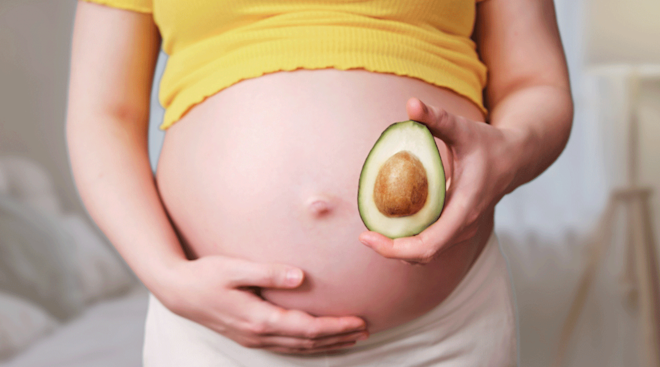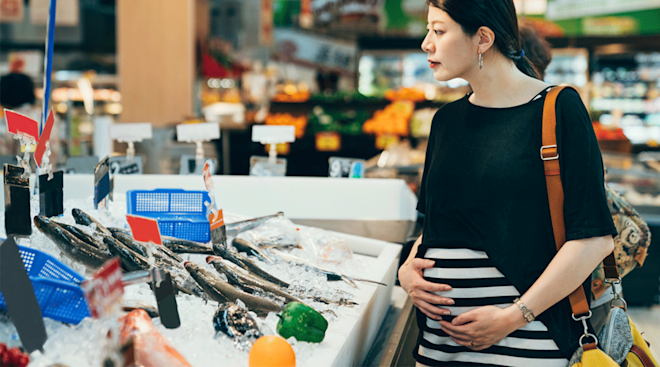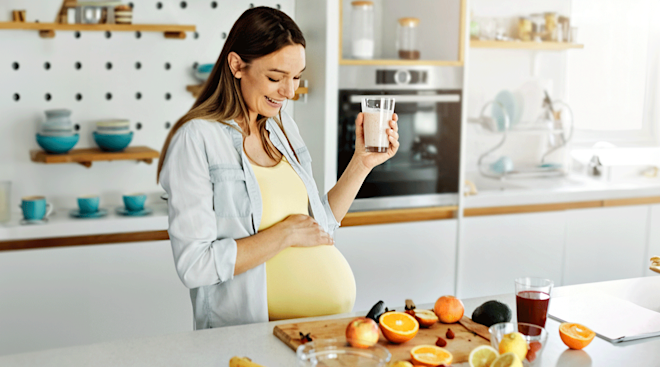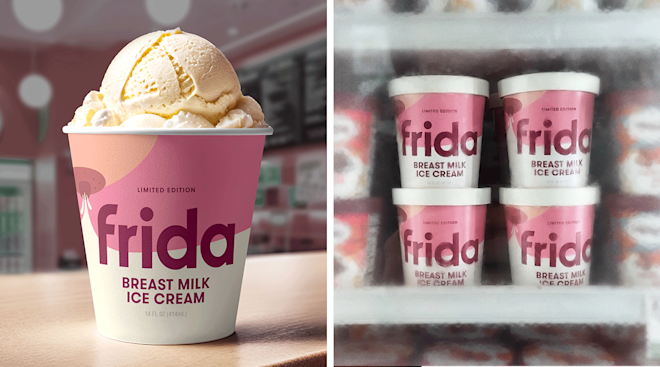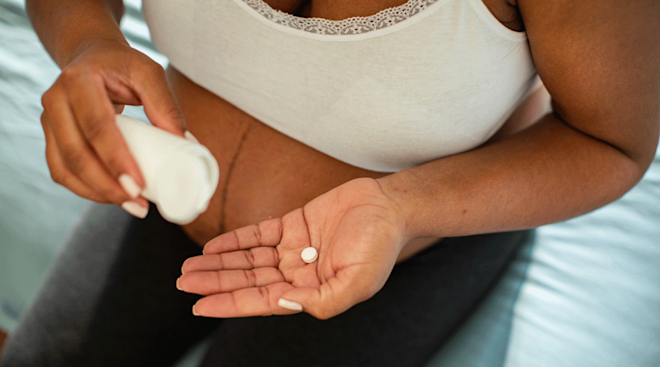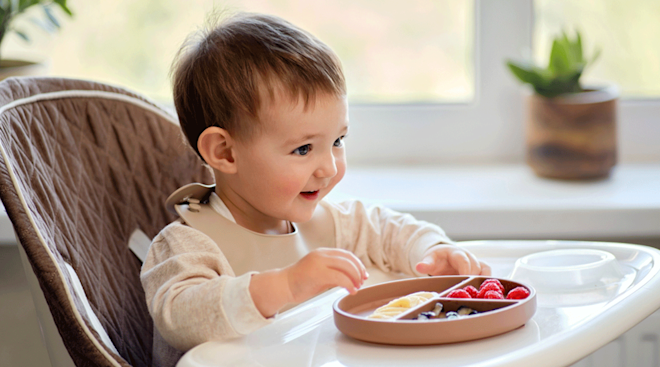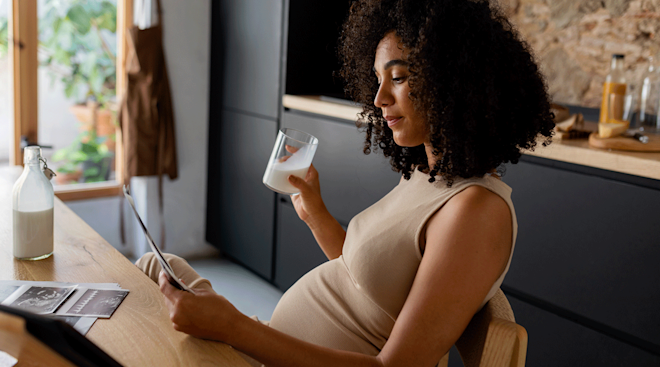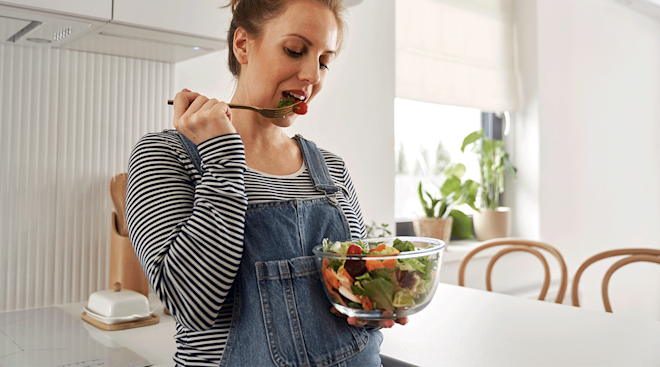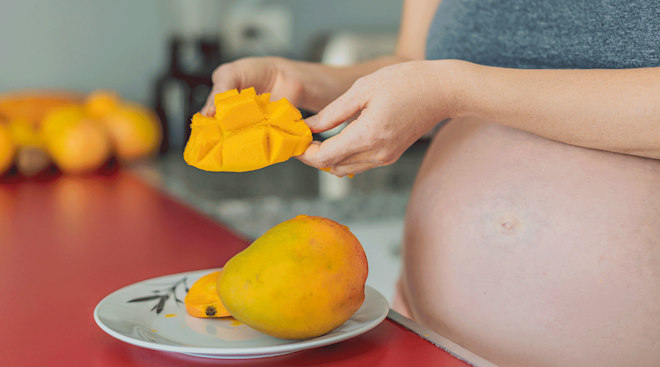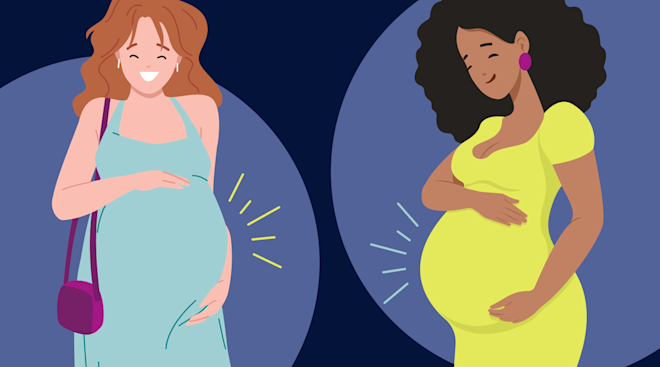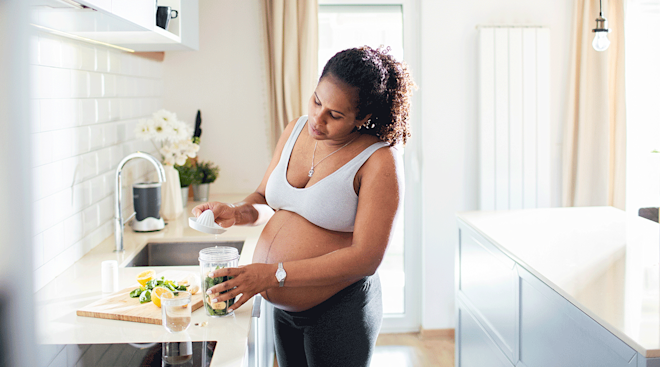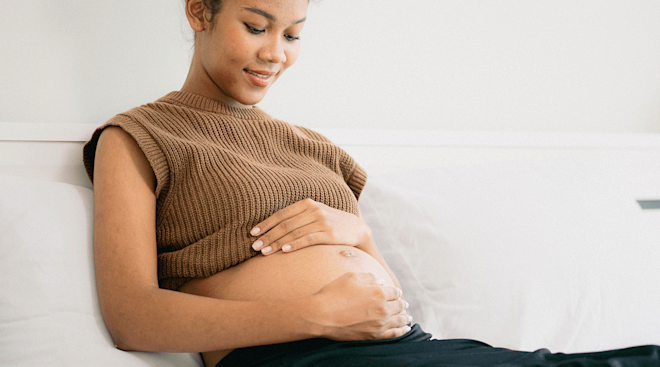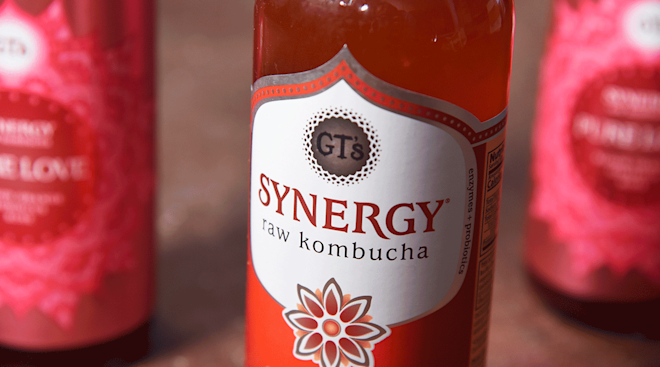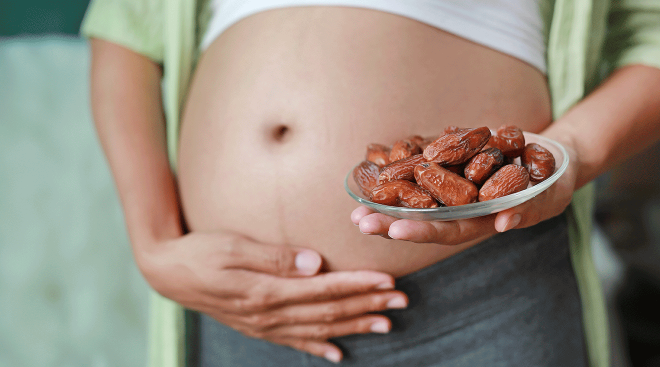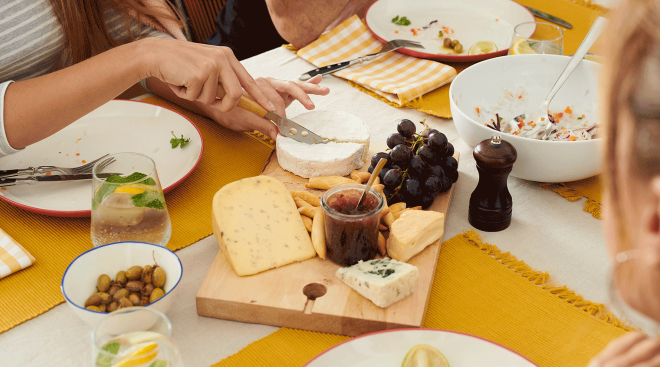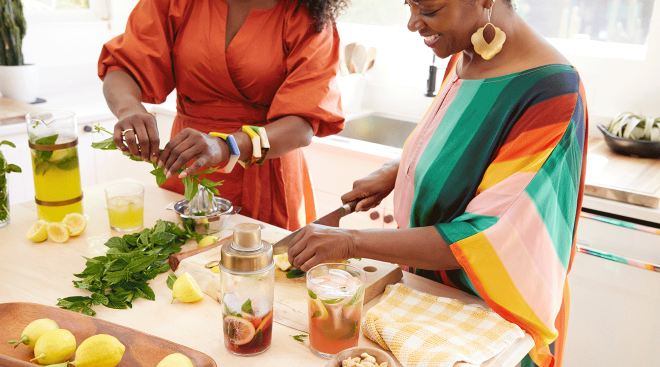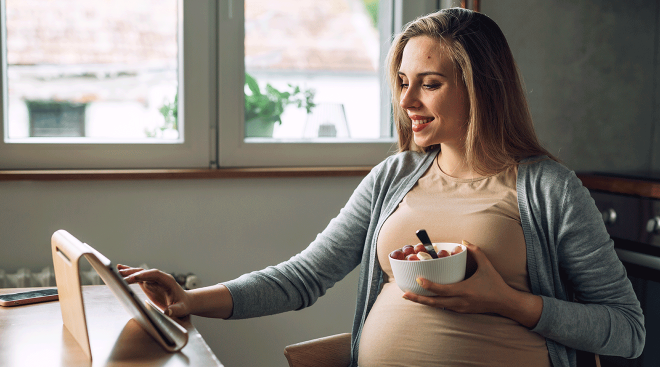Should You Avoid Ultra-Processed Foods During Pregnancy?
As an expectant mom, it’s perfectly normal to get pregnancy cravings—and, let’s face it, they’re almost never for healthy foods. No matter how much of a whole-foods eater you may have been before you got pregnant, that colorful packaging from the grocery store aisle is calling you. You don’t want organic spinach—you want salty, delicious instant noodles, and you want them now. Personally, I was obsessed with bagels when I had morning sickness. And, it’s true that these ultra-processed foods are sometimes the only thing you’re able to keep down during moments of pregnancy.
Although no one in their right mind would deny a pregnant lady a vending machine candy bar or bag of cheese puffs, how much ultra-processed food is actually okay to eat while you’re expecting? At what point does a harmless indulgence turn into an unhealthy habit that could negatively affect your pregnancy or baby? Ahead, experts tell us what to know about eating ultra-processed food during pregnancy, including how to make healthier swaps for your favorite junk foods.
All the food we eat falls somewhere on a spectrum between unprocessed or minimally processed and ultra-processed (sometimes called highly processed), according to Harvard T.H. Chan School of Public Health. Most food is processed in some way, even whole foods like fruits and vegetables, oats, lean cuts of protein and nuts. Before hitting shelves, these foods are washed, milled, frozen, cut, shelled, canned or ground, among other processes. Some foods are more processed than others, like bread, pasta and cheese, but still contain many recognizable ingredients, like flour and milk.
Ultra-processed foods, on the other hand, are significantly changed or transformed from their natural forms during the manufacturing process. A bag of potato chips, for example, goes through a long manufacturing process—including frying with oil and seasoning with salt and artificial flavorings—before it becomes a convenient snack food (that doesn’t resemble its original food source, potatoes, very much at all).
What’s the difference between processed and ultra-processed foods?
Processed foods aren’t necessarily unhealthy or unsafe to eat on a regular basis. Milk, for example, is technically a processed food because it’s been pasteurized for safety, says Claire Rifkin, MS, RDN, a registered dietitian nutritionist and founder of Claire Rifkin Nutrition, LLC.
But ultra-processed foods are on a different level: Rifkin says they’re made in industrial settings, often with substances like high-fructose corn syrup and seed oils, plus food additives you wouldn’t normally see in home cooking, like artificial flavors, colors, emulsifiers and thickeners. This makes them less healthy to eat on a regular basis.
“Ultra-processed foods are those hyper-palatable, factory-made foods loaded with extra calories, carbohydrates, fats and chemical additives,” says Greg Marchand, MD, FACOG, an ob-gyn and expert in minimally invasive gynecologic surgery in Arizona. “Think neon-orange cheese puffs or pre-packaged pastries, not your grandma’s homemade soup.”
Is it ideal to avoid ultra-processed foods during pregnancy? Yes. But it’s also highly impractical, and can seriously limit your options if you’re struggling with pregnancy symptoms like morning sickness, acid reflux and food aversions. When mom of five Alexandra F. was pregnant, she says she ate Raisin Bran cereal daily because it was soothing to her nausea.
It’s not necessary to totally avoid ultra-processed foods as long as the majority of the foods you eat are healthy and nutrient-dense, says Marchand: “Eating ultra-processed foods in moderation during pregnancy is generally safe, but it’s wise to keep them as an occasional treat rather than a dietary staple.”
He adds that a small indulgence, like a slice of store-bought cake, isn’t likely to negatively affect your pregnancy if the rest of your pregnancy diet is packed with quality fats, proteins and fiber. The key is balance: “Satisfy the occasional craving, but prioritize whole foods to keep you and baby thriving,” says Marchand.
Even outside of pregnancy, consuming a lot of ultra-processed foods as part of your regular, daily diet can increase your risk of health conditions like heart disease, obesity and type 2 diabetes, per Cleveland Clinic. We’re not talking about the occasional indulgence, but the reality is that many of us are probably eating way more ultra-processed food than we realize: A 2025 study found that ultra-processed foods make up more than half of American adults’ calorie intake.
Eating too many ultra-processed foods during pregnancy can introduce risks to both Mom and baby, says Marchand, so it’s worth keeping these foods to a minimum.
What are the risks for mom-to-be?
Ultra-processed foods are usually calorie-dense, and not in a good way: These are empty calories, which are derived from fats and sugars and increase your caloric intake without adding any nutritional value, says the University of Michigan.
Typically, ultra-processed foods are also packed with carbohydrates and fats, which can lead to excessive weight gain during pregnancy, says Marchand. He adds that this is about more than just fitting into your pre-pregnancy jeans: While weight gain during pregnancy is totally normal, excessive weight gain “increases the risk of gestational diabetes, hypertension and preeclampsia, all of which can complicate pregnancy and require closer monitoring.”
Ultra-processed foods also often have a high glycemic index, Marchand says, which can cause blood sugar spikes and potentially push you toward insulin resistance or gestational diabetes.
What are the risks to baby?
According to Marchand, excessive weight gain or poorly controlled blood sugar in pregnant moms can lead to something called macrosomia—where baby grows larger than average. This increases the chance of delivery complications like shoulder dystocia or the need for a C-section, he adds.
We get it, sometimes you need a specific flavor of Doritos. But substituting your cravings for healthier choices will pay off over time—and it gets easier the more you do it. When Megan K., a mom in Toronto, Canada, was pregnant, she says she craved Skittles “big-time,” but eventually realized her body was just craving a fruity flavor: “I ate some berries and they hit the spot, so after that, every time I wanted Skittles, I ate berries instead.”
If you’re craving something highly processed but want to make a healthier choice, here are some easy swaps:
- Roasted chickpeas or air-popped popcorn instead of packaged chips
- Plain Greek yogurt with berries and nuts instead of flavored yogurt
- Plain cooked oats mixed with fresh fruit, cinnamon, and maple syrup instead of flavored instant oatmeal packets
- Oats, dates and nut butter instead of packaged breakfast pastries
- Seltzer water infused with fruit instead of soda
- Good-quality dark chocolate instead of a candy bar
That said, sometimes only the real deal will do. So if you and baby are really craving that bag of Skittles, go for it!
By now, you know that perfection shouldn’t be the goal. Still, minimizing ultra-processed foods is key to eating healthy during pregnancy. Here’s what experts recommend for a healthy pregnancy diet:
Eat (mostly) whole foods
Prioritize whole foods like fresh fruits and vegetables, lean protein, whole grains and healthy fats as often as possible, per the Office of Disease Prevention and Health Promotion. “In general, try to choose foods that are closest to their natural forms in nature,” says Rifkin. “That being said, not everyone has that privilege to access and choose whole foods.”
Read nutrition labels
Rule of thumb: The ingredients should be, at least mostly, foods you recognize. “Some ingredients to look for on food labels to avoid would be things like: added sugars (dextrose, glucose syrup), artificial sweeteners (acesulfame potassium, sucralose), artificial flavors or colors (Red 40, Blue 1), hydrogenated oils or trans fats, and emulsifiers and stabilizers (carrageenan, polysorbate 80, or mono- and diglycerides),” says Rifkin.
Stay hydrated
Staying hydrated while pregnant is super important. Marchand recommends drinking 8 to 10 cups of water each day to support your increased blood volume and reduce swelling during pregnancy. He recommends skipping soda, sports drinks, and energy drinks, which are often high in sugar and caffeine (and sometimes have other ingredients that aren’t pregnancy-safe).
Keep healthy snacks at the ready
Plan for and prepare nutrient-dense snacks like Greek yogurt with fruit or carrots with hummus—Marchand says these foods will curb your hunger and help override the temptation to hit the vending machine.
Don’t completely restrict yourself
“Cravings are part of the pregnancy adventure,” says Marchand. “If you’re dying for something processed, have a small portion and pair it with something wholesome—like a few chips with guacamole or a scoop of ice cream with fresh strawberries.”
Supplement thoughtfully
Don’t forget your prenatal vitamin, which ensures you’re getting the right amounts of key nutrients like folic acid, iron, calcium and vitamins C, D, A and B, helping you and baby stay healthy.
Frequently Asked Questions
What is the NOVA classification system?
The NOVA classification system puts foods into one of four categories based on how processed they are. According to the Academy of Nutrition and Dietetics, the four categories are:
- Unprocessed or minimally processed foods, i.e. fresh fruit, milk, frozen vegetables, oats and eggs
- Processed culinary ingredients like olive oil, honey, and vinegar, which are processed to be used in cooking and preparing other foods
- Processed foods, which have added sugar, oil, and/or salt, but are still related to their original form (i.e. canned tuna in oil, bread, sausages, cheese, salted nuts)
- Ultra-processed foods, which are made almost entirely in factories and include added sugars, fats, preservatives, dyes, stabilizers, flavor enhancers and corn syrup
What are the worst ultra-processed foods?
In general, ultra-processed foods are the least healthy type of food, but some options are worse than others. Rifkin flags ultra-processed foods that are high in added sugars and unhealthy fats but have no real nutritional value: sodas, packaged pastries, highly processed meats like pepperoni and meat sticks, instant noodles and shelf-stable lunch kits.
Can ultra-processed foods affect fertility?
While the effects aren’t direct, ultra-processed foods can contribute to several health issues that may throw your reproductive system off balance, says Marchand:
- High levels of carbs and sugars can cause insulin resistance, which may interfere with ovulation by disrupting normal levels of fertility hormones like luteinizing hormone (LH) and follicle-stimulating hormone (FSH)
- High levels of calories and carbs can cause excessive weight gain, which is connected to infertility
- Excess body fat can raise estrogen levels and exacerbate conditions like polycystic ovary syndrome (PCOS), another common cause of infertility
What should you look to avoid on an ingredient list food label?
You can’t always avoid eating ultra-processed foods, but it helps to know which ingredients are bigger red flags than others. Again, Rifkin says to avoid the following:
- Added sugars, especially if they’re listed more than once as ingredients like dextrose and glucose syrup
- Artificial sweeteners like acesulfame potassium and sucralose
- Artificial flavors or colors like Red 40 and Blue 1
- Hydrogenated oils or trans fats
- Emulsifiers and stabilizers like carrageenan, polysorbate 80, or mono- and diglycerides
What are the dangerous processes that make a food ultra-processed?
Rifkin says the danger isn’t necessarily in specific processes that ultra-processed foods go through, but in the combination of aggressive refining, chemical additives and dilution of beneficial nutrients.
“Ultra-processed foods are often designed to be hyper-palatable, easy to overeat and shelf-stable,” she explains, “but at the same time, they also tend to be low in fiber, micronutrients and protein, and high in added sugars, sodium and unhealthy fats.”
Is it okay to give babies and toddlers ultra-processed foods?
It’s not recommended. According to the World Health Organization (WHO), ultra-processed foods increase the risk of childhood obesity and may even influence food preferences as your child grows up. Unfortunately, ultra-processed foods made for babies and toddlers are becoming more common; a 2024 study found that 60 percent of infant and toddler foods available in popular grocery stores fail to meet nutrition guidelines set by the WHO.
Cravings are a normal part of pregnancy, and it’s okay if some of your cravings are for ultra-processed foods in all their manufactured, chemically flavored, highly caloric and—let’s be honest—delicious glory. But moderation is always important—before, during and after pregnancy. Eating an excessive amount of ultra-processed foods raises your risk for health conditions like obesity and heart disease, and can have negative effects on your pregnancy too, increasing your risk for gestational diabetes and preeclampsia.
The bottom line? Strive for a well-balanced diet during pregnancy that leaves room for ultra-processed foods if you want them, but isn’t built around them. “I encourage my patients to embrace the 80-20 rule: Aim for 80 percent wholesome foods, and allow 20 percent for indulgences,” says Marchand.
Please note: The Bump and the materials and information it contains are not intended to, and do not constitute, medical or other health advice or diagnosis and should not be used as such. You should always consult with a qualified physician or health professional about your specific circumstances.
Plus, more from The Bump:
Greg Marchand, MD, FACS, FICS, FACOG, is an ob-gyn and expert in minimally invasive gynecologic surgery, as well as the founder of the Marchand Institute for Minimally Invasive Surgery in Arizona. He leads the Society of Laparoscopic and Robotic Surgeons-accredited fellowship at Steward Health. He earned his medical degree from Spartan Health Sciences University in St. Lucia.
Claire Rifkin, MS, RDN, is a registered dietitian nutritionist and the founder of Claire Rifkin Nutrition, LLC. She’s based in New York City.
Academy of Nutrition and Dietetics, Examining the Nova Food Classification System and the Healthfulness of Ultra-Processed Foods, January 2025
Bulletin of the World Health Organization, Ultra-Processed Food for Infants and Toddlers; Dynamics of Supply and Demand, April 2023
Cleveland Clinic, Fetal Macrosomia, May 2022
Cleveland Clinic, What Ultra-Processed Foods Are (and Why They’re So Bad for You), March 2023
Nutrients, An Evaluation of the Nutritional and Promotional Profile of Commercial Foods for Infants and Toddlers in the United States, August 2024
The Journal of Nutrition, Trends in Adults’ Intake of Un-processed/Minimally Processed, and Ultra-processed foods at Home and Away from Home in the United States from 2003–2018, January 2025
The Nutrition Source, Harvard T.H. Chan School of Public Health, Processed Foods and Health, August 2023
University of Michigan, Empty Calories
US Department of Health and Human Services, Office of Disease Prevention and Health Promotion, Eat Healthy, March 2025
US Department of Health and Human Services, Office on Women’s Health, Weight, Fertility, and Pregnancy, February 2021
Real-parent perspectives:
- Alexandra F., mom of five
- Megan K., mom in Toronto, Canada
Learn how we ensure the accuracy of our content through our editorial and medical review process.
Navigate forward to interact with the calendar and select a date. Press the question mark key to get the keyboard shortcuts for changing dates.


































